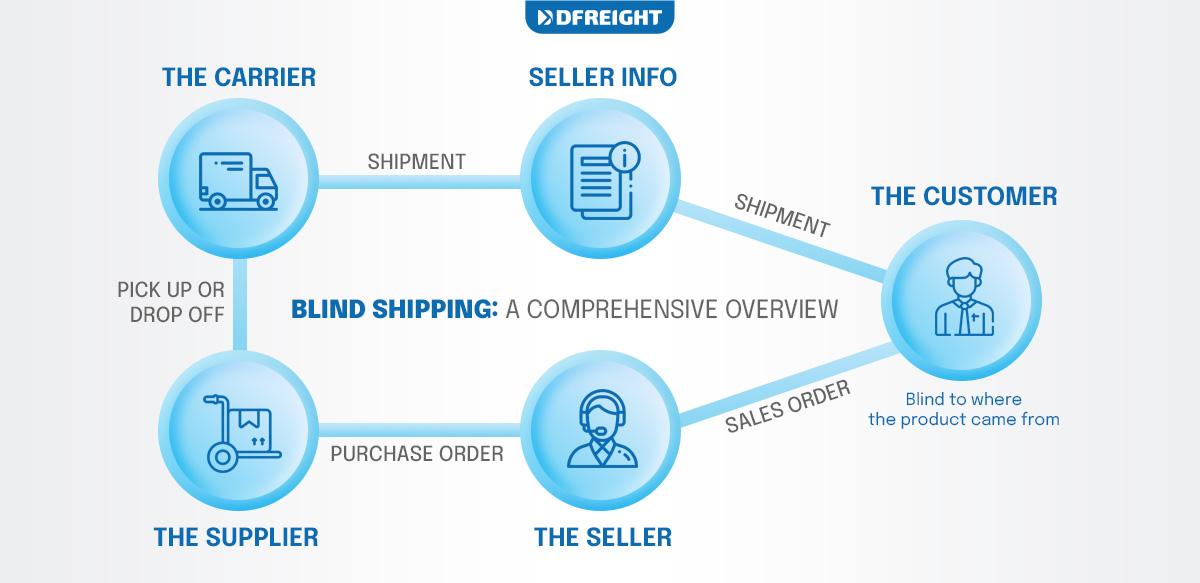Do you want to keep your business’s suppliers a secret from your competitors and customers? If so, blind shipping is a popular supply chain management approach that can help you accomplish this. Blind shipping involves sending orders from the manufacturer/supplier straight to the customer without revealing the name or identity of the supplier. This article discusses the advantages and disadvantages of blind shipping for businesses and how to prepare for a blind shipment in easy steps. If you feel curious, keep on reading.
Table of Contents
Blind Shipping in a Nutshell
Blind shipping is a dropshipping where orders are sent straight from the manufacturer/supplier to the client while concealing the name and identity of the supplier. This way, the customer presumes that the shipment came directly from the distributor. In other words, a blind shipment is utilized when a seller doesn’t want the customer to know who the original producer or supplier is.
Like white label services, there is no branding or labeling that indicates who the source is. The shipment must be paid for in advance, and the request to ship blind must be made before shipping. The bill of lading (BOL) is then transported to its final destination without the shipper’s (supplier’s) name and contact information.
The Philosophy Behind Blind Shipping
Occasionally, keeping people in the dark is beneficial. Many companies rely on keeping the name of their suppliers a secret to prevent consumers and competitors from bypassing the company and going directly to the supplier. Fortunately, blind shipping enables organizations to accomplish just that. Numerous businesses have utilized this method to protect the financial security of their operations.
Blind shipments are virtually always carried out at the distributors’ request. Consider that your company is based in Dubai, UAE. You have searched far and wide for a reputable supplier of rare material, and after an exhausting and expensive quest, you’ve located one. Wouldn’t you do everything you can to keep that supplier a secret from your competitors and customers?
Businesses that don’t take the initiative to keep their suppliers’ identities secret run the risk of being eliminated from the buyer-seller dynamic. Of course, not all businesses must maintain the secrecy of their suppliers; some don’t have to because they have other advantages that guarantee their relevance. However, it is in your best interest to protect that advantage if your firm draws customers because you can offer particular products they can’t obtain anywhere else. That is where blind shipping comes to help.
By keeping your supplier’s identity a secret, blind shipping is a popular supply chain management approach that safeguards your company (and possible profits or recurring revenue). This method helps you retain your role as the middleman rather than losing customers to your supplier, encouraging consumers to place orders from you again rather than directly from the source. Blind shipping decreases the possibility that your business’s suppliers may become known to competitors.
An Illustration of a Blind Shipment

Let’s say you are the vendor, and a consumer orders a collection of books. If you are the shipper, you must contact the freight forwarding business, arrange payment, and request blind transportation.
The carrier will delete the supplier’s information from the original Bill of Lading (BOL) after your package has cleared customs, making the data unavailable to the buyer. This process will prevent customers from contacting your supplier directly to purchase goods at a lower price instead of dealing directly with you. Even if another business finds the shipment, they won’t be able to identify the supplier.
Advantages of Blind Shipping for Businesses
Blind shipping is quite helpful for some businesses. The ability of a company to maintain its supply chain without divulging such information to competitors cannot be priced. Blind shipping is primarily a supply chain management strategy that brings many benefits.
1. Retain Your Customers
Since blind shipping conceals crucial details about the producer/supplier, the customer only knows the distributor’s name. As a result, the distributor can easily continue to act as a middleman and increase its revenue through repeat purchases. As a result, distributors can effortlessly retain their brand’s reputation by keeping everyone in the supply chain happy.
2. Gain Higher Profit Margins
If distributors establish solid relationships with the suppliers, they may even be able to negotiate the pricing and obtain goods at a reasonable cost. This strategy helps them gain an advantage over their competitors by buying products at a lower cost and selling them for the same price to their customers.
3. Maintain Competitive Advantage
If you are a company that knows where to find the best ingredient for a particular product, all your competitors will be desperately searching for the same thing. Protecting that edge is of the utmost importance if you plan your business to survive and succeed. Blind shipping is nearly always a step you can take to ensure you maintain that advantage.
4. Protect Your Supplier
Suppliers may not always want their information shared. There are numerous explanations for this. There are situations when businesses and suppliers have exclusivity agreements that would be compromised if the supplier’s identity was revealed to snoops. Blind shipping is a neat solution here. Keeping data about their location and business activities private can safeguard your supplier’s privacy.
5. Keep a Hands-Off Supply Chain Management
Blind shipping offers a hands-off method to manage your business while keeping it secure and risk-free. Your supplier handles order shipment for you while anonymous, so you do not have to worry about stocking and maintaining inventory. Even though this is a cost-effective logistics strategy, many companies, particularly e-commerce businesses, opt to store goods with a third-party logistics (3PL) partner for greater control, faster transit times, and fewer hassles.

Disadvantages of Blind Shipping for Businesses
Even while blind shipping has several substantial benefits for business owners, it also has the following disadvantages.
1. Customer Concerns About the Authenticity of Goods
Customers today are picky about the brand name and the product’s country of origin. This information might be easily accessible to consumers in the internet age. If customers have questions regarding the product, they can look up its specifications and perhaps get in touch with the manufacturer personally. This can endanger a distributor’s business in the long run. However, the absence of such crucial information in a blind shipment may cause the consumer to doubt the originality of the goods. As a result, they may even lose faith in the seller and look for another vendor in the market.
2. Difficulty in Asking for a Refund
A significant drawback that blind shipping may cause is that consumers cannot request a refund quickly if they are unaware of the manufacturer’s identity and location. Therefore, if a product is defective, the customer has to throw it away. This drawback can seriously harm the brand value and negatively affect customer experience.
3. More Complicated Paperwork
Since the Paperwork involved in sending a blind shipment differs from the other shipping processes, the distributor must go through a more sophisticated documentation process. Here, the distributor needs to provide three different Bills of Lading (BOLs) to meet various requirements. It is also crucial to ensure that the documents do not include the supplier’s name, return address, invoice, and coupon codes. All this makes the blind shipping process trickier and more complex.
4. Exclusive Carrier Restrictions
Blind shipments may be subject to only limitations imposed by some carriers to ensure accurate billing. In this case, some carriers may accept suppliers’ false names with phony phone numbers and addresses, but the city and zip code must always match that of the firm. Other carriers may demand that the zip code be correct. Some carriers allow for the complete address and contact details to be false. Therefore, finding a carrier that fulfills your requirements might be challenging. Make sure to question the carrier when you schedule your blind shipments because everything depends on their policies.
How to Prepare for Blind Shipping

preparation for blind shipment is more challenging than it first appears. To manage everything without making mistakes, you must be sufficiently cautious. If you believe your company can benefit from blind shipping, keep reading the quick guide to preparing yourself for your customer’s next blind shipment.
1. Employ a Freight Forwarder
Finding a trustworthy freight forwarding company or shipping agent is the first step in making your shipment blind. Blind Shipments should be a specialty of a professional freight forwarder. Along with connections and risk management expertise, the freight forwarder should be able to manage your blind shipment diplomatically. Fortunately, many freight forwarding firms and brokers provide these services at reasonable costs. Find one that fits your demands and price range.
2. Proceed with the Paperwork
With a professional freight forwarder in hand, you can quickly move forward with the shipment preparation and do the required Paperwork. These qualified experts will also outline any additional documentation or information the distributor might be required to complete, such as including the zip code on each BOL.
Firstly, through his connections, the freight forwarder will help find an appropriate carrier for your goods. Then, it will request two or three separate bills of lading (BOLs) for the blind shipment. Unlike standard shipping methods, blind shipments require more than one BOL.
A bill of lading (BOL) document contains relevant information regarding the shipment, including the sender’s (shipper) identity, the recipient (consignee), and the quantity shipped. Therefore, at least two bills of lading are necessary while dealing with the blind shipment.
As you may know, the first bill of lading is the original one that displays the essential information about the cargo. This BOL is hidden from the blinded customer. The second and maybe third BOLs are the dummy/false ones that do not display genuine details about the supplier. On delivering the shipment to the customer, the carrier will switch the BOLs and provide the customer with a fake bill of lading.
There may be other Paperwork needed to complete the shipping process in addition to these essential ones. Thus, before shipping out products, it is crucial to get in touch with the local carrier.
3. Leave the Rest up to your shipper
Your work is finished once you have completed all necessary steps and given the customer’s name and address; your shipping agent will take care of the remaining tasks.
Wrap Up
Blind shipping is a great way to keep your suppliers a secret and protect your competitive advantage. However, it is essential to be prepared for the potential disadvantages, such as customer concerns about the authenticity of goods, difficulty in asking for a refund, and more complicated Paperwork.
DFreight is a digital freight forwarding company that can help distributors with blind shipments. If you have any experiences with blind shipping, please share them in the comments below.
FAQs
What is blind shipping?
Blind shipping is a shipping method in which orders are sent straight from the manufacturer/supplier to the client while concealing the name and identity of the supplier.
What are the advantages of blind shipping for businesses?
There are several advantages of blind shipping for businesses, including retaining customers, gaining higher profit margins, and maintaining a competitive advantage.
What are the disadvantages of blind shipping for businesses?
There are also some disadvantages of blind shipping for businesses, such as customer concerns about the authenticity of goods, difficulty in asking for a refund, and more complicated Paperwork.
Why do companies make blind shipments?
Companies make blind shipments to protect the identity of their suppliers and to maintain their competitive advantage. This way, customers cannot connect with the supplier and place orders directly as they do not have access to that information.
Is blind shipping a legal shipping method?
Yes, blind shipping is an entirely legal shipping procedure that helps distributors conceal the supplier’s identity from their customers.
What is double-blind shipping?
Double-blind shipping is a type of blind shipping in which both the supplier and the customer are anonymous. A freight forwarder typically arranges this shipping method.














